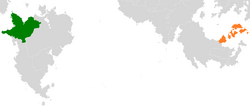Mutul-Pulau Keramat relations
 | |
Mutul |
Pulau Keramat |
|---|---|
| Diplomatic mission | |
| Embassy of His Divine Lordship, Kopiona Poi | Embassy of Pulau Keramat, K'alak Muul |
| Envoy | |
| Ambassador Aj Kan Hamui | Ambassador Paxathipatai Vongsay |
Mutul-Pulau relations refers to the bilateral foreign relations between the Mutul and Pulau Keramat. Both countries share a special relationship, embedded in rich commercial history beginning with the Spice Trades, the Trans-Makrian Circuit and the establishment of the Thirteen Nuk Nahob within the Ozerosi region.
History
During the 16th century, the Nuk Nahob, equivalent of Trading Companies, sent many expeditions across the Makrian Ocean with the purpose of circumventing the monopole of the Rezeses and of the Latins on the Thalassian Ocean. The Mutuleses first reached Tsurushima and managed to obtain a Legation to represent their interests in the Shogunate, alongside other regular foreign economic partners. The Nuk Nahob then established trade posts in South Ochran, and continued their road westward. It’s then that they reached the archipelago of Pulau Keramat.
The islands were then divided among many kingdoms and cultures. in 1560, the first Mutulese trade post was opened in the Solustheris Isles. In the early 17th century, the archipelago had been reunified under one kingdom, with whom the Nuk Nahob maintained good commercial relations. Before this event, many Pulaui had fled the chaos of the Age of Fire by serving as sailors on Mutuleses ships. After the reunification, a number of mercenaries and other companies of aimless soldiers found new jobs and opportunities by serving as private forces for the Nuk Nahob, being engaged en-masse during the War for Kahei. Naval experts from the Solustheris Isles were notably sought after by the Nuk Nahob who engaged them to form their own navigators and officers; Pulaui mercenaries ended up serving as enforcers and guards for the Nuk Nahob.
Pulau Keramat would remain independent for the duration of the Mutulese Ochran, serving as an important resting port and jump-pad for the Mutuleses toward the Ozeros Sea, but also as a source of spices and raw products, and a consumer market for Mutuleses goods. The coastal areas and larger islands were chequered by a network of Trade Posts and Factories, strengthening the commercial and political ties between the two kingdoms.
These relations soured in the aftermath of the Second War for Kahei when the Mutul sold parts of its Vespasian possessions to Arthurista; however both Pulau Keramat and the neighboring Ankat were given full autonomy, and become fully independent will the collapse of the Mutulese Ochran.
Modern days
In the late 19th century, the Confederacy of Pulau Keramat renewed its ties with the Mutul : a trade agreement was signed,a Mutulese embassy in Kopiona Poi and a Pulaui embassy in K’alak Muul were established. The Mutulese embassy was one of the first monarchial nations to be granted a permenant embassy within Pulau Keramat, alongside other traditional Malaio entities such as Onekawa-Nukanoa and Chasania, which had been the nations that Pulau Keramat had drawn to after the souring of relationships between Mutul and Pulau Keramat. Since then, several visits have been made between each other leaders.
Economic Relations
In 2017, the Mutul was one of the largest trading partner of Pulau Keramat; following a trend of Trans-Vespanian Exchange that furthered economic relations and commerical organization between Oxidentale and the Ozeros. In 2019, the Mutulese B’olon Tz’akab for International Trades said their country affirmed its commitment to increase trade and investment as part of a determined effort to reach out to its trading partners and to reassure that the Divine Kingdom was welcoming the decision of Pulau Keramat to further continue its economic and politic de-isolation. Exchange of capitals, goods, services, investments, between K’alak Muul and Kopiona Poi have only grown since the Free Trade Agreement of 1960, with the Mutulese New Chamber of Commerce (Mutun Tzik’iwiknah, “MTKN”) has been providing Mutuleses businesses with networking, knowledge exchange, trade assistance and support in Pulau Keramat.
Education Relations
The Tzewayib’ has opened institutes in Pulau Keramat to promote the Mutli language and the Mutulese culture, suporting local Mutli teaching and facilitating cultural exchanges in relationship with the Pulaui government.